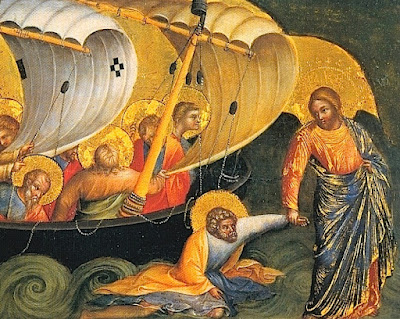The Christmas story that we know and love
involves Mary and Joseph and the baby Jesus,
and a journey to Bethlehem and no room at the inn,
and a stable and a manger and a donkey and an ox,
along with angels and shepherds,
and three good kings and one very bad one.
Assembled from the Gospels of Matthew and Luke
with a bit of the prophet Isaiah thrown in,
this is the story depicted in our nativity pageants
and in the manger scenes in our homes.
and a journey to Bethlehem and no room at the inn,
and a stable and a manger and a donkey and an ox,
along with angels and shepherds,
and three good kings and one very bad one.
Assembled from the Gospels of Matthew and Luke
with a bit of the prophet Isaiah thrown in,
this is the story depicted in our nativity pageants
and in the manger scenes in our homes.
But for the first Mass of Christmas day,
much of that story seems missing.
Our Gospel reading from Luke
does give us shepherds,
but not the exciting part with the angels
who exhilarate and terrify them,
announcing the birth of the world’s savior
and peace and good will to all people,
but rather the part where they arrive
once the excitement is over
and see what to all appearances
is an ordinary newborn child.
We have Mary and Joseph and the child,
but we hear not of the search for shelter
or of the birth itself,
but of a moment of repose
when “Mary kept all these things,
reflecting on them in her heart.”
We may feel that we, like the shepherds,
are arriving in the early light of day
once all the excitement of the night is over.
But in fact we, like Mary,
have arrived at a moment
of contemplative stillness
amid momentous events.
And in that stillness we hear
the true mystery of Christmas.
St. Paul, without mentioning
any of the elements of the Christmas story,
speaks to us of what we celebrate this day:
“the kindness and generous love
of God our savior appeared,
not because of any righteous deeds
we had done
but because of his mercy.”
are arriving in the early light of day
once all the excitement of the night is over.
But in fact we, like Mary,
have arrived at a moment
of contemplative stillness
amid momentous events.
And in that stillness we hear
the true mystery of Christmas.
St. Paul, without mentioning
any of the elements of the Christmas story,
speaks to us of what we celebrate this day:
“the kindness and generous love
of God our savior appeared,
not because of any righteous deeds
we had done
but because of his mercy.”
This is the great mystery we celebrate
each year at this time.
Not the stable, not the manger,
not the donkey, ox, or angels,
not Mary nor Joseph,
not even little baby Jesus—
but the kindness and generous love
of the one who comes to save us,
not because we are good,
but because God is good.
This is the mystery made flesh
in the infant born in a manger,
watched over by donkey and ox.
This is the true marvel for which
the shepherds glorify and praise God.
This is what Mary cherishes in her heart.
each year at this time.
Not the stable, not the manger,
not the donkey, ox, or angels,
not Mary nor Joseph,
not even little baby Jesus—
but the kindness and generous love
of the one who comes to save us,
not because we are good,
but because God is good.
This is the mystery made flesh
in the infant born in a manger,
watched over by donkey and ox.
This is the true marvel for which
the shepherds glorify and praise God.
This is what Mary cherishes in her heart.
St. Bede, in a commentary on Luke’s Gospel,
imagines Mary’s reflection on this mystery:
“As I contemplate his greatness,
which knows no limits,
I joyfully surrender my whole life,
my senses,
my judgment,
for my spirit rejoices
in the eternal Godhead
of that Jesus,
that Savior,
whom I have conceived
in this world of time.”
Cherishing all these things in her heart,
Mary holds within herself still
the mystery to which she has just given birth:
the God whose greatness knows no limits
born within the limitations of time and place
out of love for us
and for our salvation.
Mary surrenders to that mystery,
so that the joy of Christ conceived in her
might be hers for eternity.
imagines Mary’s reflection on this mystery:
“As I contemplate his greatness,
which knows no limits,
I joyfully surrender my whole life,
my senses,
my judgment,
for my spirit rejoices
in the eternal Godhead
of that Jesus,
that Savior,
whom I have conceived
in this world of time.”
Cherishing all these things in her heart,
Mary holds within herself still
the mystery to which she has just given birth:
the God whose greatness knows no limits
born within the limitations of time and place
out of love for us
and for our salvation.
Mary surrenders to that mystery,
so that the joy of Christ conceived in her
might be hers for eternity.
We too are called
to cherish in our hearts
this mystery that teeters
on the edge of the incomprehensible:
this divine love that
no goodness found in us calls forth,
but which explodes into our world
in a shocking, disorienting, thrilling act
of sheer mercy given to us
who deserve no mercy.
The 17th-century mystical author
known as Angelus Silesius wrote,
“If Christ is born
a thousand times in Bethlehem
but not in you,
you remain still forever lost.”
This is the work Christmas calls us to
in this morning of contemplative repose;
it calls us to the work of Mary:
the work of surrendering ourselves to God
whose mercy we can never merit,
of cherishing the memory of that mercy,
so that its mystery might seep into our souls,
of letting that mystery be born in us anew
so that we might become vessels
bearing mercy to our world,
so that God in his mercy
might have mercy on us all.
to cherish in our hearts
this mystery that teeters
on the edge of the incomprehensible:
this divine love that
no goodness found in us calls forth,
but which explodes into our world
in a shocking, disorienting, thrilling act
of sheer mercy given to us
who deserve no mercy.
The 17th-century mystical author
known as Angelus Silesius wrote,
“If Christ is born
a thousand times in Bethlehem
but not in you,
you remain still forever lost.”
This is the work Christmas calls us to
in this morning of contemplative repose;
it calls us to the work of Mary:
the work of surrendering ourselves to God
whose mercy we can never merit,
of cherishing the memory of that mercy,
so that its mystery might seep into our souls,
of letting that mystery be born in us anew
so that we might become vessels
bearing mercy to our world,
so that God in his mercy
might have mercy on us all.













